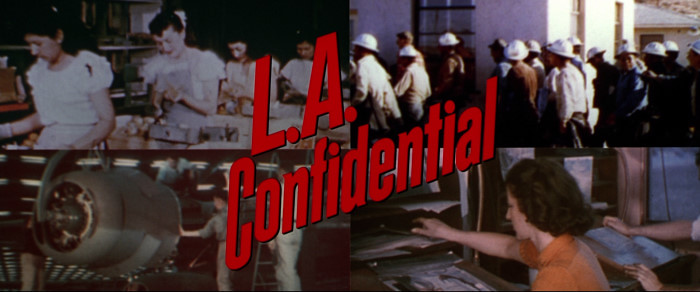
Truth is, this was picked for unrelated reasons, but it makes such a great counterpoint to The Thin Man, at least in terms of how messy and chaotic a mystery story can get and how differently you can deal with that phenomenon. Like any good Chandler or Hammett story, the deeper a detective looks the more mess he uncovers, and it takes a staggering genius to take all those loose threads and craft a single tapestry. One way to deal with it, the way most common for '40s PIs like Philip Marlowe and Nick & Nora Charles, is to just dive into the chaos and come out the other side with a story, and let the middle just be a mess of shadowy characters and uncovered conspiracies, murder stacked on murder until the detective(s) point the finger and solve the case. The joy here is watching the hero walk through the muck and get in and out of pickles and interact with boldness and tenacity. But the contemporary mystery often takes a sharper and smarter route, and L.A. Confidential may be the best example of that style: the detective(s) don't walk through quite so much muck, and they don't get into and out of quite as many pickles, and they don't interact with as many thugs and villains with the same kind of near-nihilistic daring -- instead they actually go through the procedure of solving a case, and all those loose threads and uncovered conspiracies are more than just excuses for more thugs and exciting traps and sexy dames. In the old films, I think the color was the story, but now the clues are the story. And like I said, L.A. Confidential does a great job of juggling an amazing number of disparate clues and crimes and cover-ups and bringing them all together to a single story without ever feeling clunky or confusing or obnoxiously detail-oriented. It's a full two hours long but it zooms by and although your head swims a little in subplots, you never feel like you're drowning. It keeps its eye on the goal and it keeps moving forward. It's a brilliant story and a brilliant script.
Plus, I'm always a big fan of any solid trio of heroes. Luke, Leia and Han; Kirk, Spock, and McCoy; Peter, Egon and Ray; The Dude, Walter and Donnie; Groucho, Chico and Harpo; even, yes, Harry, Hermione and Ron. The dynamic of trios is always the most fun, and each can represent a different personality trait or philosophical perspective. The unspoken rule is that, really, it takes all three to be a complete person, and that's why they always work. Heart, Brain and Body; Id, Ego and Superego; Words, Actions and Feelings. Break it down however you like, but I'm always much much more excited by trinaries than binaries. Pull out a single element, explore what the new dynamic is and what's missing. An endless wealth of drama is built into every good trio. And here, with Bud White, Jack Vincennes and Ed Exley, you get a character driven toward thoughtless instinctive action (loosely, the id), one driven toward self-aggrandizement and narcissism (the ego), and one driven toward a moral universe with an unbreakable conscience (the superego). But of course we also undermine each, by having Bud need to protect women and want to be smarter than he is; by having Jack's conscience creep in and drive him to do the right thing; and by having Exley constantly and deliberately maneuvering himself toward positions of political power. So each is sufficiently self-contradictory that we want to spend more time with them and explore their inner conflicts, but they play off each other and the world around them in beautifully archetypal ways that serve the story well. No two of them alone ever would have solved the case of the Nite Owl Massacre, let alone uncovered the corruption behind it all, and it's naturally and appropriately the perfect storm of bringing these three men together than allows the house of cards Dudley Smith and his co-conspirators have built to collapse. You need the fighter, the thinker, and the charmer to gather the pieces. That they all mistrust or outright hate each other until the very last possible moment that they can reconcile and align... well, that's good drama. Like I said: this is an amazing script. I don't normally check this kind of thing, but I had to here -- and yes, L.A. Confidential won best adapted screenplay for 1997.
Good damn thing.

No comments:
Post a Comment